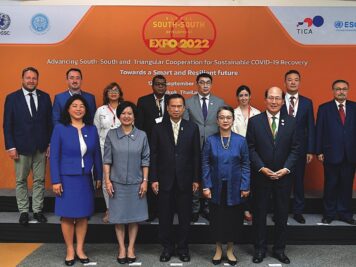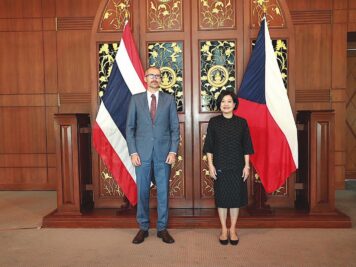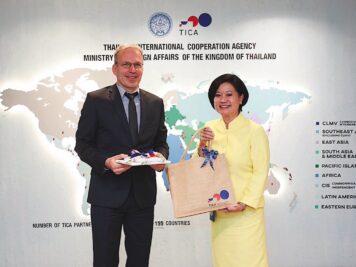A partnership for development in the making
Text: Mr. Kraichok Arunpairojkul, Minister Counselor, Thailand International Cooperation Agency;
Edit: Martina Hošková; Photo: Archive
Established under the Ministry of Foreign Affairs in 2004, the Thailand International Cooperation Agency (TICA) actively promotes the country’s development diplomacy. In the post-COVID-19 context, TICA focuses on building resilience to boost human security in food, health, job, and energy & environment. TICA’s track record speaks for itself. Many of its development projects were recognized as the Sustainable Development Goals’ best practices. Currently, TICA and the Czech Development Agency are exploring new possible avenues for development cooperation.
Thailand is sharing our pathway to a more balanced and inclusive growth
The achievement of the Sustainable Development Goals (SDGs) has been put at serious risk by multiple and overlapping crises. Amid daunting, multi- dimensional development challenges that call for collective leadership and urgent actions, we have seen emerging donors playing more prominent roles in international development cooperation. Among emerging Asian providers of development cooperation is Thailand, which offers its unique approach to achieving sustainable development – Sufficiency Economy Philosophy for Sustainable Development Goals, or SEP for SDGs.
Established under the Ministry of Foreign Affairs in 2004, the Thailand International Cooperation Agency (TICA) actively promotes the country’s development diplomacy, which is firmly grounded in the “5S” Foreign Affairs Masterplan. “Sustainability and Status are two key aspects of the 5S Strategy. It seeks to enhance Thailand’s role as an international partner for sustainable development, while promoting the country’s status in the international community through its soft power, including development cooperation,” said Mrs. Ureerat Chareontoh, Director-General of TICA, who was Ambassador of Thailand to the Czech Republic from 2018 to 2021.
To contribute to global progress towards the SDGs, TICA’s work is guided by SEP, a homegrown development approach that was conceived by His Majesty King Bhumibol Adulyadej The Great, and integrated into the 20-Year National Strategy. Mrs. Ureerat said, “SEP is our pathway to achieve more balanced and inclusive growth. So, SEP for SDGs is our unique approach, which we share with fellow developing countries to advance sustainable development. It is complemented by the Bio-Circular- Green (BCG) Economy Model to support the global transition towards a cleaner and greener world.”
TICA’s track record speaks for itself
In the post-COVID-19 context, TICA focuses on building resilience to boost human security in food, health, job, and energy & environment. It emphasizes human resource development, institutional capacity building, and local ownership in order to ensure sustainability. Its technical assistance is provided mainly through scholarship and training programs, development projects, and the dispatch of experts and volunteers. The prioritized areas include agriculture, public health, climate change & environmental protection, renewable energy, community-based tourism, and skills development.
TICA’s track record speaks for itself. Many of its development projects were recognized as SDG best practices by the United Nations Office for South-South Cooperation (UNOSSC), and by the United Nations Department of Economic and Social Affairs (UN DESA). These include, among others, the Thailand- Germany-Mongolia Trilateral Project on Sustainable Tourism Development, based on SEP in Mongolia; the Friends from Thailand (FFT) Volunteer Program; and Sustainable Community Development, based on the SEP Application for the One Gewog One Product (OGOP) Model Project in Bhutan.
In September 2022, Thailand, UNOSSC, and the United Nations Economic and Social Commission for Asia and the Pacific (ESCAP) co-hosted the 11th Global South- South Development Expo (GSSD Expo) in Bangkok. This Expo showcased best practices in development cooperation, and provided a timely forum to discuss strategies and solutions to development challenges in the post-COVID-19 world. Mrs. Ureerat noted, “Our event had a good turnout of around 1,200 participants. But, more importantly, it was the spirit of solidarity and positive impacts on global development that the Global South has shown to the world through South- South and Triangular cooperation.”
The SDGs can only be achieved by strong global partnerships
SDG 17 underscores the importance of effective partnerships in order to make progress towards the shared development vision. In addition to increased multi-stakeholder engagement, notably with the Thai private sector and academia, Thailand continues to forge new partnerships beyond its borders. Currently, TICA and the Czech Development Agency (CzDA) are exploring possible avenues for development cooperation in third partner countries, such as short training in smart farming, agricultural cooperative management, post-harvest management, agri-food processing, and public health for the Mekong sub- region or ASEAN member countries. In August of this year, Mahidol University and Charles University – two prominent universities in the two respective countries – jointly conducted a Universal Treatment Curriculum for Addiction Professionals in Thailand’s Chiang Mai province for Cambodia, Lao PDR, Myanmar, and Bhutan. This collaboration was jointly initiated and supported by TICA and relevant agencies of the Czech Republic.
As Mrs. Ureerat has stressed, “The SDGs can only be achieved by strong global partnerships and cooperation. As a responsible member of the international community, Thailand will leverage our expertise, experiences, and network of partners to help advance the global development agenda. Next year will mark the 50th milestone in our diplomatic relations. I very much look forward to seeing TICA and the Czech Development Agency work together to help advance the SDGs. This will open a new chapter in Thai-Czech relations and cooperation in the years to come.”





[…] Thailand International Postgraduate Programme (TIPP) was established in 2000 by the Thailand International Cooperation Agency (TICA). This scholarship initiative aims to enhance postgraduate education for international students, […]
[…] International Postgraduate Programme (TIPP) was established in 2000 by the Thailand International Cooperation Agency (TICA). This scholarship initiative aims to enhance postgraduate education for international students, […]